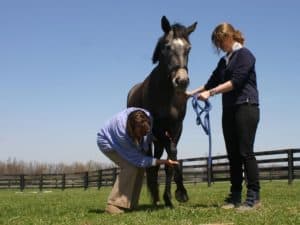The Orphan Foal
The birth of a long-awaited foal is an occasion to celebrate. All of the planning, breeding dates, pregnancy checks, and hopes finally are realized. But what if the unthinkable happens–the mare becomes ill, or she doesn’t produce any milk, or worse, she dies. What do you do with the foal? How do you care for him/her? How and what do you feed the little one? This article will discuss some of the options/considerations for caring and feeding of orphan foals.
Those of you who are new to breeding and raising horses might have never experienced the dilemma of raising an orphan foal or feeding a foal whose mother is producing little or no milk. It is a very real problem and can be a very time-consuming ordeal. Foals can lose their mothers for any of a variety of reasons, such as colic, uterine hemorrhage, or the mare can reject her foal completely. Other problems can occur that result in the inability of the mare to produce adequate milk for the foal, such as mastitis (infection of the mammary gland), metritis (infection of the uterus), or any other serious illness. If a mare is grazing fescue pastures while in late pregnancy, there is a fungus that can live on the grass named Acremonium coenophialum, which if ingested by the mare will block her ability to produce milk for her newborn foal. The foal is not an orphan technically, but another source of milk must be found immediately. This fungus also can lead to other serious problems with foaling, such as dystocia or a weak foal.
Newborn Orphans
Newborn foals rely entirely on their mother’s milk for nutrition. The first milk a foal ingests is colostrum. It is essential as it provides much-needed immunoglobulins that help a foal fight off infection, since foals are born with a virtually inactive immune system. Therefore, if a foal is orphaned at birth, it is a particular emergency to find another source of not only milk, but of colostrum
Create a free account with TheHorse.com to view this content.
TheHorse.com is home to thousands of free articles about horse health care. In order to access some of our exclusive free content, you must be signed into TheHorse.com.
Start your free account today!
Already have an account?
and continue reading.
Written by:
Christina S. Cable, DVM, Dipl. ACVS
Related Articles
Stay on top of the most recent Horse Health news with












